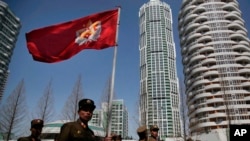With a million personnel, the Korean People's Army is among the largest in the world.
It's also cited as one of the most vulnerable groups of people to a possible coronavirus outbreak in North Korea.
"A coronavirus outbreak in the military will be Kim Jong Un's biggest fear," said Lee Unggil, former member of North Korea's special forces "Storm Corps" or the 11th Corps.
During a forum Wednesday at Washington's Hudson Institute about the lives of North Korean soldiers, Lee explained that the military's conditions are prone to a massive outbreak.
Crowded barracks
Lee explained the North Korean soldiers live in crowded barracks with poor living conditions so diseases spread fast.
"In early 2000s, there was SARS [Severe Acute Respiratory Syndrome] outbreak in the military. North Korean soldiers are very malnourished and their immune system is weak, so many people died. But we didn't even know whether it was because of SARS or other diseases. There aren't any testing kits. If someone dies with fever, we presumed it was an epidemic," Lee said.
Lee was in North Korea's "Storm Corps" from 1998 to 2003, and he defected to South Korea in 2007.
Some 43% of the North Korean population, or 11 million people, are suffering from malnourishment, making them highly susceptible to infectious diseases.
Jung Haneul, who defected to South Korea by crossing over the Military Demarcation Line a few years ago, told VOA that living conditions in the military improved somewhat after Kim Jong Un assumed power but medical conditions remain dire.
"If there's coronavirus outbreak in North Korea, the military will be on the highest alert," Jung noted. "The soldiers will be barred from contact with civilians. There's no way masks will be distributed. Whenever there's an epidemic, people resort to gargling with salt water."
Jung said while he was in the military, there was scabies infestation, but the soldiers didn't have the proper medication so they burned sulfur.
Regime threat
John Everard, former British ambassador to Pyongyang, told VOA a COVID-19 outbreak in the North Korean military could threaten Kim's totalitarian rule.
"Should this happen, the regime would face not only the weakening of its defenses caused by sickness amongst its soldiers, but also the political dangers of widespread military discontent. This could pose a serious threat to it," Everard said.
"The word is spreading that many North Koreans died in the border area with China infected by the coronavirus," Lee added, citing his sources in North Korea.
VOA's William Kim and Ji Da-gyum contributed to this report.





